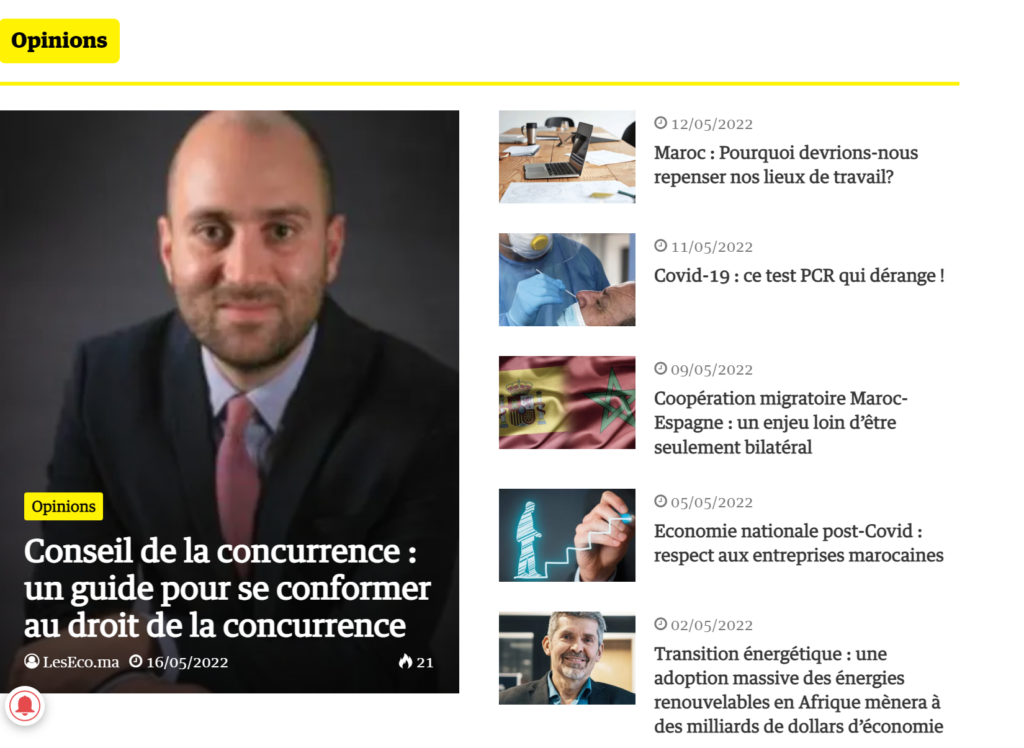This article was published in the Les Eco edition of Monday, May 16, 2022.



The guide published by the Competition Council, at the beginning of the year on January 25 precisely, presents a very concrete approach including the principles of Law 104-12 and allows companies (and professional organizations) to comply with the provisions of competition law and to instill in Morocco new practices and a new culture of competition law.
Let us recall in this respect that the Competition Council has taken an important place in recent years since the legislator decided to reactivate it by appointing a president of the body in November 2017. The council, which has remained inactive for more than five years, has regained its role and place conferred on it by the constitution in its Article 166.
Compliance with the provisions of competition law in accordance with the guide is an essential prerequisite in view of the importance of administrative fines (a maximum of 10% of the amount of global or national turnover excluding consolidated tax) and custodial sentences for managers or employees (up to five years in prison).
This guide invites each company to have a compliance program built around five fundamentals which are:
- A commitment from the company's management;
- The establishment of internal relays for the dissemination of the principles of the compliance plan;
- Information, communication, training and awareness of all employees within the company.
- The establishment of a framework document and appropriate procedures.
- Identification and control of non-compliance risks.
A strong commitment from top management
The compliance program must first receive a strong impetus from the company's management. In practice, it is recommended to vote on a resolution at a general meeting or at a board of directors either that can adopt the manual for compliance with competition rules, or that requires the Chief Executive Officer and senior executives to carry out and take all the necessary actions to comply with the applicable provisions of competition law.
The establishment of relays within the company
In a second step, the company will have to identify internal relays that will be in charge of monitoring the implementation of the compliance program. Although the council speaks of internal relays, it indicates that this function can be exercised by a consulting firm or lawyers. The important thing is that this designated person has the necessary means to access the information, but also the technicality and skills required to master the subtleties of competition law. In practice, we recommend that this function be carried out by the group's legal department (or failing that, the audit department) assisted by a specialized external law firm, consulted punctually. The designated person must be directly attached to the top management and have a certain independence and a reputation for probity to carry out his mission.
Adoption of specific internal standards and rules
Subsequently, the company (or professional organization) must be accompanied in the drafting of a manual and the implementation of appropriate procedures. Depending on the size of the structure, it is possible that a simple code of conduct, or even internal notes are enough. This documentation must at least provide for five themes that are essential for the competition council. It will be necessary to provide a summary presentation of competition law, a presentation of the company's policy by insisting on the commitment of the management, to identify the possible risky behaviors and behaviors specific to the company, a reminder of the sanctions applicable by the employees and a reference to the internal procedures of the company specific to competition law.
Awareness-raising and training actions
The company will then have to set up targeted communication, awareness-raising and training actions. The relays designated by the company will have to popularize in particular the provisions 104-12 of the law either by simple communication actions and accessible to non-lawyers, or by pedagogical training actions allowing employees to increase their skills by mastering the subtleties of competition law. In practice, it is recommended to carry out a double action of communication and training accompanied by simple and effective supports.
Identify and prioritize risks
Finally, the company will have to identify the competitive risks to which the company is exposed. This legal audit must extend to the various contracts signed or in the process of being signed, but also to partnerships with competitors or non-competitors, and to the minutes of general meetings on commercial decisions and the minutes of external bodies, such as associations bringing together the actors of the same sector. Once these risks have been identified, they will have to be prioritized according to severity, probability and existing protective measures.
In most cases, this audit, carried out by an external specialised firm, it will be necessary to identify any anti-competitive practices which may take the form of unlawful cartels, abuse of a dominant position, abuse of economic dependence or abusively low selling price practices. The audit will have to determine the existence of risks related to economic concentrations, namely the implementation of anti-competitive practices by one of the parties to the concentration, the absence of notification of a concentration to the Competition Council, the implementation of the concentration before the intervention of the decision of the Competition Council, the omission or reporting of inaccurate data in the notification file or the implementation of the concentration in contravention of the terms of the Council's decision.
During this audit phase, interviews should be conducted with employees who are affected by competitive risks and who may potentially commit violations of competition law. Most of the time these employees are senior executives, sales and legal representatives and any employee with a relationship with competitors, customers or suppliers.
Follow up with alert procedures and disciplinary measures
Once the compliance program is in place, the company will need to ensure controls. To do this, it is essential to set up an alert system within the company that allows employees to communicate confidentially with internal or outsourced compliance relays. While employees should not be afraid of reprisal if they warn of anti-competitive practices, it is important to clearly stipulate the disciplinary measures to which offenders are exposed. These measures can be a warning, reprimand, demotion, dismissal, and even legal action directed against the person.
